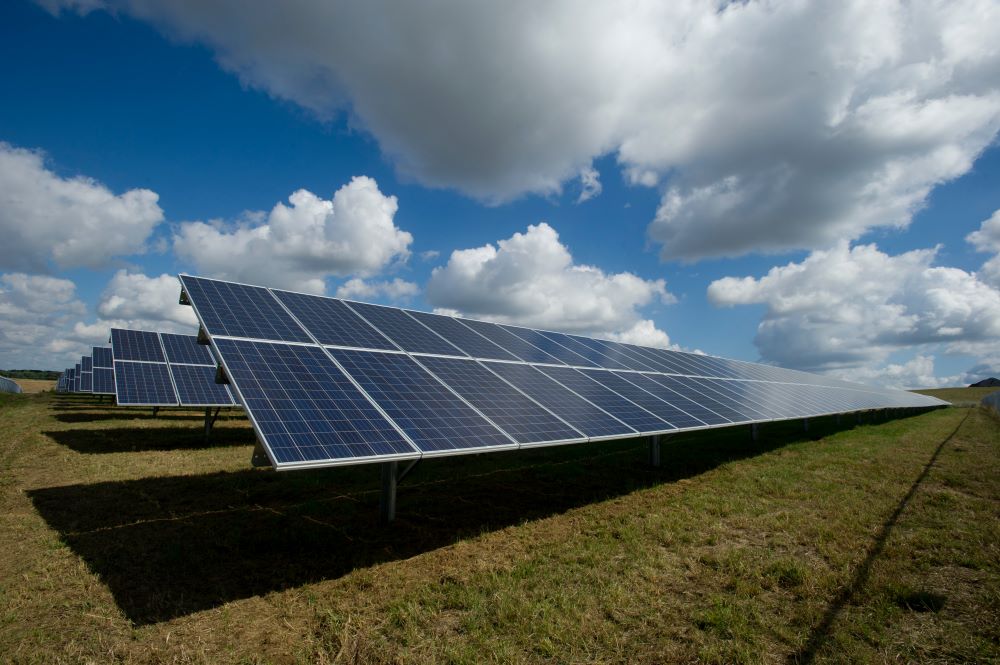
In Georgia, the question of "who is my neighbor?" has expanded to include the benefits and opportunities — for everyone — that come with a transition to clean energy and a new green economy. (Unsplash/American Public Power Association)
Meta, the company that owns Facebook and Instagram, has announced three new, large solar projects in my home state of Georgia. The deal is part of an agreement for Walton EMC to provide renewable energy equivalent to 100% of Meta's data center energy usage in Newton County. Meta and my family now share a utility provider, Walton EMC.
This news has me reflecting on the question "Who is my neighbor?"
As Georgia makes moves to become a green giant, the Christian value of "loving your neighbor" could be an animating force for changing the narrative in the state from a divisive political one of "turning purple" to a unifying values-based vision for "transitioning to green."
With the benefits of more local jobs, cleaner air and better health, Georgia's clean energy transition is taking green policies out of the heated political arena and doing what some may deem a miracle — getting Republicans and Democrats to agree.
Democrat Sen. Jon Ossoff reflected recently to The Atlanta Journal-Constitution, "I think there's broad bipartisan support in Georgia … for securing energy independence, for ensuring that there is a robust supply of affordable energy that's not destroying our environment."
Meanwhile, the all-Republican Georgia Public Service Commission, with a major push from Republican Commissioner Tim Echols, also recently tripled the budget for Georgia Power's Make Ready Program, putting $53 million toward upgrading electric vehicle charging stations over the next three years.
Earlier this month, the Republican-controlled Georgia House of Representatives passed House Bill 406, expanding EV-charging opportunities across the state, by a vote of 161-0. Imagine finding that kind of bipartisan consensus on anything right now.
And over in ruby-red Cartersville, about 35 miles northwest of Atlanta, QCells is building a $2.31 billion solar panel manufacturing plant that will hire 2,000 workers and possibly meet 30% of total U.S. solar panel demand by 2027. QCells also announced the expansion of its site in Dalton, Georgia — bringing with it 510 more jobs — a move that drew praise from Republican Rep. Marjorie Taylor Greene.
Advertisement
The passage of the Bipartisan Infrastructure Law and the CHIPS Act would not have been possible without Georgia and the 2021 election of Sens. Raphael Warnock and Ossoff. When you also take the Biden administration's Inflation Reduction Act and Justice 40 into consideration, Georgia has played a key role in giving all American "neighbors" a stake in the new green economy.
Already, data shows nationally that over 60% of the major projects receiving federal investment are taking place in districts represented by Republican policymakers who voted against the IRA.
That is a feature, not a bug, of the new green paradigm, but it's not just red and rural communities benefiting. The Justice 40 initiative has set a goal that 40% of the overall benefits of federal investment find their way to marginalized communities that have been historically underserved and overburdened by pollution.
The secular world says it is easier to love our political neighbors and hate our partisan enemies. But as a Black millennial and evangelical climate organizer, I believe we can demonstrate the kingdom by loving and praying for those we disagree with so we may "be children of our Father in heaven."
Environmental matters like climate change shouldn't be a partisan issue but still at times can turn neighbors, including people of faith, against one another. In Georgia the broad values of protecting the life and health of children, while ensuring economic opportunity, are bringing unity. Recent polling from the AJC illustrates that "80% of Democrats, a slim majority of independents and roughly half of Republicans" support Georgia becoming an EV hub.
No wonder Republican Gov. Brian Kemp declared in his State of the State address that by the end of his second term, Georgia will be "the electric mobility capital of America."
In Georgia, the question of "who is my neighbor?" has expanded to include the benefits and opportunities — for everyone — that come with a transition to clean energy and a new green economy.







